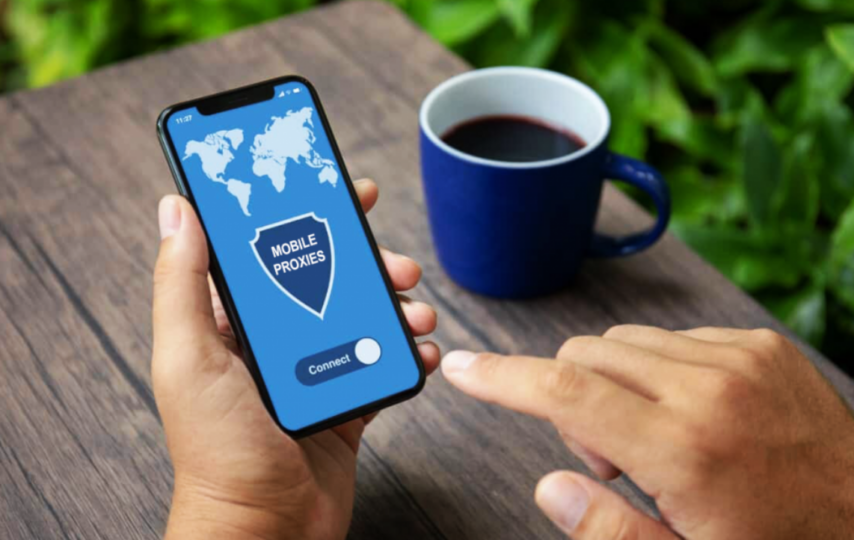Using a smartphone to connect to the internet is common. Most websites are optimized for mobile devices, and almost all online services have dedicated apps to improve the customer experience. However, mobile proxies are not that widely used as opposed to residential or datacenter counterparts. Many users avoid them, fearing lower performance in online activities.
While in some cases this is true, understanding the fundamentals of how they work is an eye-opening experience for online security and privacy. Here, I’m going to define mobile proxies, highlight their differences from other types, and show how they can be the best choice in many scenarios.
How do mobile networks work?
Mobile or cellular networks enable radio waves-based communication between devices across large distances. Such networks are built by connecting various individual stations that have their own area coverage, called cells. One cellular tower can transmit voice, radio, internet (4g and 5g, for example), and other types of content.
Every cell typically uses its own set of frequencies, which makes it possible for them to overlap without interference. More importantly, it enables users to move within the area of multiple cellular towers and not lose the connection.
A connected mobile device is constantly in connection with a tower or multiple ones. It transmits signals to them, checking whether the speed of the connection is optimal. If the device finds a better-performing cellular tower, he connects to it. Such a process saves the energy of the device as well as increasing the performance of the connection.
This is well illustrated with radio stations. If you listen to one station while traveling in a car, you will need to change to another frequency for the same station after a certain distance. A similar principle applies to mobile internet connections.
Once you travel to a service range of another cellular tower, your device will automatically connect to it. Unlike with the radio frequency, the change isn’t noticeable by the end user, but a crucial aspect of connection is changed – IP address.
An Internet Protocol (IP) address is a unique string of digits that identifies each device connecting to a network. This applies to all devices, even ones that are using landline internet. However, such connections can remain static and not have to change their IP address ever.
Due to the possibility of movement, mobile connections are dynamic by default. Your mobile device is constantly looking for an optimal connection. So, every time you move, you connect to another tower, which assigns your device a new IP address.
With the introduction of 3G internet, the connection with cellular towers became so advanced that mobile devices were able to browse the web and perform other demanding tasks. Nowadays, the 4G and 5G standards enable such fast internet connections that mobile internet can be used even for hosting proxies.
Mobile proxies defined
A mobile proxy is an intermediary server run on a mobile device that uses a mobile internet connection (usually 4G or 5G). So, even if you are connecting from a PC with a proxy mobile connection, you can access the internet as if using a mobile device.
As such, mobile proxies serve two purposes. First, it disguises your original IP address. No website or service can identify you or know your location. This is useful for many cases, from web scraping to bypassing geo-restrictions, but it’s a basic function all proxies achieve.
More specifically, mobile proxies give the possibility to access mobile apps and access the web as a mobile user. Many websites have different versions for visitors from mobile devices, and some mobile apps do not have PC versions available. Some e-commerce websites even go as far as to provide different prices for mobile users.
But even if you just want to ensure anonymity, using a mobile proxy might be your best option. No matter how you count, at least half of internet users are accessing the web with a mobile device. Some other estimates bring this number to as high as 80 percent.
If you want to remain anonymous, it’s easier to blend in with a larger crowd. The best way is to use a mobile proxy. Additionally, mobile IP will rotate by default, which further increases your anonymity.
Mobile vs residential vs datacenter proxies
It must be noted that other types of proxies have their advantages too. Residential proxies are based in ordinary homes and verified by an internet service provider. They can provide the same level of legitimacy while providing a static IP address. Some software might work only with these proxies.
Datacenter proxies are easier for websites to notice as they use business-tier internet connections and are created virtually in bulk using powerful servers. However, these proxies are relatively cheap and can achieve connection speeds far greater than mobile or residential proxies. Datacenter proxies are best for when you need to transfer large amounts of data.
Online tasks with mobile proxies
Data collection. While mobile proxies aren’t the fastest in bandwidth speed, they compensate by having excellent legitimacy and access to mobile-only data. Mobile IP rotation does not arouse so much suspicion while allowing scraper bots to bypass ant-scraping measures.
Social media management. While most platforms can be accessed both on a PC and on mobile, good automation measures for multiple accounts are only possible on a PC. Using mobile proxies with automation software is the best way to efficiently manage multiple accounts.
Application testing. Most developers don’t have the resources to run actual mobile devices for testing apps. So, it’s easier to use mobile proxies and run testing software from a laptop. Additionally, mobile proxies can allow testers the possibility to access an app from specific locations.
Final words
The picture of how mobile proxies can supplement your everyday privacy needs should be clearer now. Mobile proxies route your connection through a cellular tower, which has some distinct advantages when it comes to online privacy and security.








